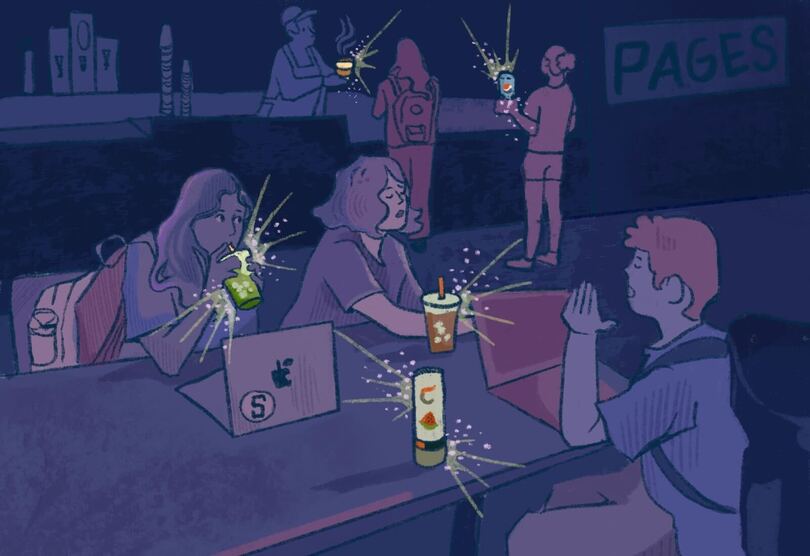Early morning pick-up, late night fuel: Syracuse University runs on caffeine

For late night study sessions at Bird Library and early mornings before class, Syracuse University students rely on various caffeinated beverages to give them a needed energy boost. Hannah Mesa | Illustration Editor
Get the latest Syracuse news delivered right to your inbox.
Subscribe to our newsletter here.
On any given weekday at Syracuse University’s Schine Student Center, the Dunkin’ line can be seen extending to the atrium and often past the Gaming and Esports Center. In lecture halls, classrooms and all the floors of Bird Library, canned energy drinks and People’s Place coffees rest next to laptops with full calendars and keyboards clacking away.
“Lowkey, I wish I didn’t drink as much caffeine,” SU junior Anna Quigley said. “At this point, I feel like I’m addicted.”
From homemade cold brew coffees to Reign Total Body Fuel energy drinks in SU’s campus cafes, these beverages represent the unspoken companion to college life: caffeine. The drinks students consume represent their values — productivity, health, flavor or some combination of them all.
And with SU’s recent shift from PepsiCo to Coca-Cola products, the options on campus are changing, along with the habits of the students who consume them.
Senior Jessica Singh said she welcomed the shift. As a prospective student, Singh remembers the single con she added on her college pros and cons list was the fact that SU only carried PepsiCo products.
Singh said she likes the taste of Coke better than Pepsi, but was somewhat bummed to find out CELSIUS Energy Drinks would no longer be sold on campus due to their PepsiCo affiliation. She’d gotten used to having the energy drinks during late-night study sessions.
Singh only consumes caffeinated drinks a couple of times a week, when her workload demands it. She was initially hesitant to try Monster Energy or Reign drinks because of their bright packaging and aggressive reputation. But, after trying a Monster for the first time, she said she could barely tell the difference from her usual go-to.
“If I just closed my eyes and drank from a can, I would have thought it was a CELSIUS,” Singh said.
Ava Dornburgh, a junior at SU and collegiate marketing ambassador for CELSIUS, has directly seen the shift in CELSIUS availability on campus. Because students can no longer buy the products, Dornburgh said people are ecstatic when she reaches out to sponsor their organization or event.
Despite being a CELSIUS ambassador, Dornburgh’s daily drink of choice is a cold brew coffee, which she makes in her apartment every morning. Like Singh, she only drinks heavily caffeinated beverages when she’s especially tired, or sometimes when working out.
Other students on campus, like junior Isabella Jordan, steer clear of all energy drinks because of their high caffeine content.
Jordan, who never drank coffee before college, now consumes a homemade latte or Starbucks iced coffee most days. She shared a similar experience with her hometown friends, who also didn’t drink much caffeine before going off to college. Jordan turned to drinking coffee when she began experiencing a lack of sleep and an increased workload during the first couple of months of her freshman year.
“The only thing that would steady out my fatigue was having one or two coffees every day,” Jordan said. “If I don’t have a coffee in the morning, I’m just really groggy the whole day.”
Quigley consumes several caffeinated drinks a day, though it’s something she said she wants to cut back on. Her go-to drink is coffee, but like Dornburgh, she has a CELSIUS when she wants to work out or get an extra boost of energy.
Since Quigley is a junior with no SU meal plan, she said she hasn’t noticed the absence of PepsiCo products in campus cafes and dining halls like her younger peers. Quigley said her friends voiced excitement about the switch because of a preference for Coke over Pepsi.
For non-coffee drinkers, soda is a simple alternative that still provides an energizing kick. With the new Coca-Cola soda fountains in SU dining halls, some students now pair their meals with a simple Diet Coke or Sprite. Students will always find a way to get their caffeine, Jordan said.
In 2025, a nationwide study conducted by Grand Canyon University found that 95% of college students consume caffeine in some form. Coffee and energy drinks were the two most preferred sources of caffeine, the study found.
Since the transition, Singh said she still sees the same amount of CELSIUS cans in her classes as before, but now there are many more Monster cans as well. Singh said she doesn’t have a preference in drink, as long as it serves its purpose, something other students agreed with.
“I feel like some people do have this loyalty, but also, like me, some people don’t seem to care,” Singh said. “They just kind of need something to keep them awake.”
Dornburgh said that drinks like CELSIUS and coffee are such a major part of college because students are working so hard all the time.
Regardless of major or year, caffeinated drinks are a staple for SU students and college students beyond. Coffees, energy drinks and sodas seem to be as essential to college life as backpacks and pencils, and they’re here to stay whether students embrace them or not.
“Even if we slept 11 hours, we cannot stay awake without at least one cup of coffee,” Jordan said.





